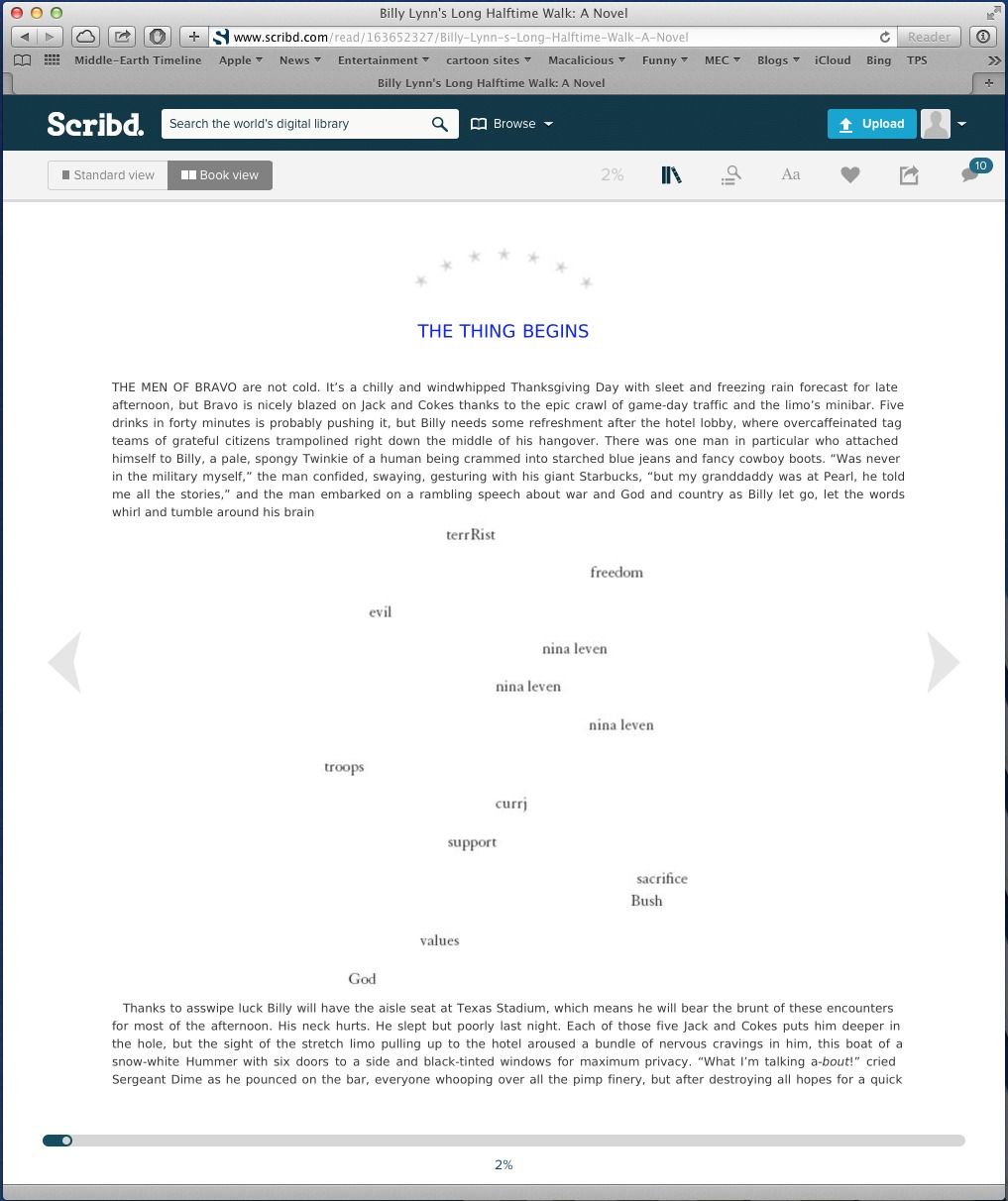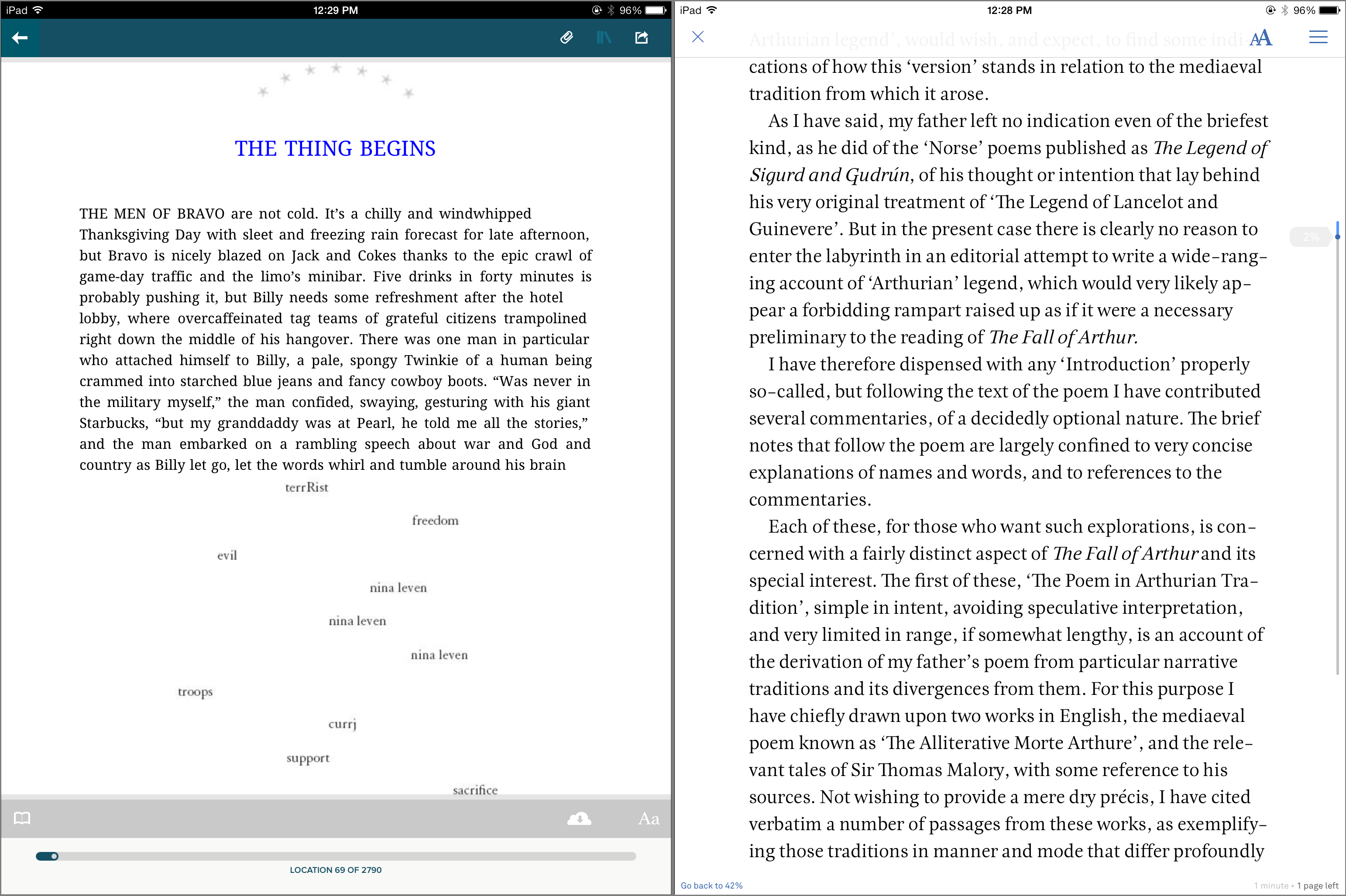FunBITS: Scribd and Oyster Aim to Be Netflix for Books
Among his many other accomplishments, Benjamin Franklin founded the Library Company of Philadelphia, the first subscription library in the British Colonies. The idea was simple: for a periodic fee, members would have access to the Library Company’s holdings; those holdings, in turn, would be paid for, added to, and maintained by membership dues. Subscription libraries, and their first cousins, circulating libraries (which were also funded by membership fees), were among the main channels by which the citizens of the land accessed books and scholarly materials. They remained in vogue until the widespread adoption of public libraries a century later.
Now, subscription libraries are back. Two online services, Scribd and Oyster, have launched modern takes on the concept, offering access to a wide array of ebooks and other digital texts. For a monthly fee, $8.99 per month for Scribd and $9.95 for Oyster, subscribers can read as many books as they like from the digital collections curated by these services.
Content for both services comes from the same major publisher: HarperCollins. The other major publishers — Simon & Schuster, Hachette Book Group, Macmillan, and the newly merged Penguin Random House — have yet to sign up. In the case of Scribd, HarperCollins has made the bulk of its backlist (books over a year old) available to subscribers; Oyster doesn’t have that massive backlist to offer, but its holdings are hardly paltry, with over 100,000 in-copyright ebooks available to its subscribers.
The user experience is similar for either service. You sign up by entering a username, email address, password, and credit card information, and then use the Scribd or Oyster iOS app to read the books that the services offer on either an iPad or iPhone (you can also sign up with Scribd within its app). Scribd also lets you read books in your Web browser. You can search for new books, add them to your personal collection (maintained within the apps — no sharesies!), and interact with other users of the service to discuss books, all inside the apps.
Both services try to nudge you to authenticate with your Facebook credentials instead of creating a new login, but neither insists that you share your book proclivities with Mark Zuckerberg and company if you don’t want to.
The reading interfaces are attractive and easy enough to use, if rather limited in terms of customizability and features. With each you can adjust type size and choose among a limited number of display options. Scribd offers “default,” “serif,” and “sans serif” as typestyle choices; Oyster offers more opaquely named alternates that amalgamate typeface and background color: for example, the Nomad style in Oyster uses an attractive sans serif face on a lightly stippled background, while its Herald style use a slightly darker
gray background and a modern serif face.
Neither reader displays page numbers: in Oyster, you get a percentage reading, while Scribd uses arbitrary location numbers similar to those in Kindle Reader; e.g., “location 69 of 2709.” Both allow you to sync your reading location between devices. Neither lets you add bookmarks, highlight passages, or insert notes. Oyster, unlike Scribd, does allow you to make and copy text selections. Oddly, Oyster envisions each book as a vertical stack of pages: you swipe up and down to turn pages, although
you can also tap the left and right margins to go forward and back; its progress gauge is presented vertically as well.
Of the two, I like how Scribd composes and displays a book’s text better than how Oyster does it. Although Oyster provides more attractive fonts and themes, it displays books as plain text, losing important things like italics and block-quote indentations. Scribd preserves those important typographic elements. Neither of the two, however, can match the beauty of iBooks’ page display or the flexibility of Marvin’s (see “Marvin Redux: A Smart Ebook Reader Gets Smarter,” 24 June 2013).
Even though both services are closely allied with HarperCollins, their holdings are not at all identical. For example, only Oyster offers Christopher Tolkien’s edition of his father’s unfinished alliterative poem, “The Fall of Arthur,” and only Scribd offers Ben Fountain’s acclaimed recent novel, “Billy Lynn’s Long Halftime Walk.”
Will this 21st century spin on an 18th century invention pay off? These are early days, so it’s hard to say. Certainly, the value proposition for publishers seems promising: they get paid a small amount every time a book is viewed, and the fact that the books they supply are sequestered within the confines of the services’ apps makes piracy difficult. Plus, it’s a great way for them to exploit their backlists without having to compete for waning shelf space in bookstores.
The convenience for pleasure readers cannot be denied: books download quickly, are available to be read immediately, and, unlike the book holdings of the services’ 18th century forebears, are not constrained by the availability of physical copies — you won’t have to wait until another patron checks in the bestseller you have been longing to peruse.
However, serious readers and students will likely be perturbed by the lack of bookmarks, highlighting, and note-taking features. Even more troubling for the bibliophile is the ultimate evanescence of a subscribed library — cancel your subscription and your book collection, like the hunter of a Lewis Carroll Boojum, will softly and suddenly vanish away. As a result, these services are, at best, suitable only for pleasure reading. And, of course, for the subscription prices to be economically sensible, you most likely want to read more than one book per month.
Nonetheless, if you would like to investigate what some are calling “Netflix for readers,” you can sign up with either service for a free monthly trial.


I use Overdrive for free with my local library. I can check out a book for 21 days at which point it checks back in automatically.
Not sure if these services limit how many people can check out the same book at the same time, the library ebooks are frequently limited to 1 or 2 simultaneous checkouts at a time.
Reading is pretty nice. I like iBooks better but just marginally. There is a complicated process to get books onto a Kindle, but it is possible (my Mom uses this so it's not super complicated but it's more than one button checkout.)
Think I'm going to stick with supporting my local library instead.
As far as I know, there is no limit on how many people can read the same book at the same time using Scribd or Oyster.
Early next week Oyster should begin to display ebooks from Smashwords, so it may become the place to go for those who like to read independent authors.
I'll have three of those books. I should look into getting them onto Scribd too.
I'd love to use one of these, but they're US only... :-(
Scribd has a long history of posting pirated material, and a quick check found material I have written lifted from my web site and other sources. They claim to remove pirated materials after complaint from the author or publisher, but they don't seem to block it from being posted again.
I dimly remember having issues with Take Control ebooks being posted on Scribd, and them taking the files down when I complained. Now I'm not seeing anything other than some excerpts that our distribution partner O'Reilly put up there, which are fine.
I do think they've put themselves in a rather untenable situation, since there's no real way to prevent such violations considering people can upload anything.
Scribd has been the subject of a number of copyright violation accusations. For example, here (and there are more):
https://www.muckrock.com/news/archives/2013/oct/10/infringe-violate-defame-scribd-does-it-all/
Since TidBits supports writers, I would be extremely cautious recommending Scribd. Just yesterday I saw an unauthorized book there, and I notified the legal copyright holder to tell Scribd to remove it.
Would you want TidBits to be uploaded there against wishes? Think about it!
As I replied above, I remember this being an issue a while back, but hadn't heard about it still being a major problem. Sounds like Scribd hasn't improved their behavior in this regard much.
Perhaps this ebook subscription thing is an attempt to get into a better line of business.